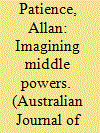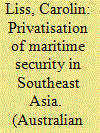|
|
|
Sort Order |
|
|
|
Items / Page
|
|
|
|
|
|
|
| Srl | Item |
| 1 |
ID:
128606


|
|
|
|
|
| Publication |
2014.
|
| Summary/Abstract |
Australia and Indonesia have engaged in cooperation on asylum policy since the late 1990s, bilaterally on immigration detention and people-smuggling agreements, and multilaterally through the Bali Process. Seen from a global perspective, this form of cooperation is one of many such bilateral and multilateral agreements that stymie the ability of asylum-seekers to gain effective and durable protection. This article argues that policy transfer theory can explain how these agreements are achieved, their political implications, and their outcome for the refugee regime and the asylum-seekers reliant on the regime for protection. In the case study of Australia and Indonesia, the authors argue that the cooperation is best understood as a form of 'incentivised policy transfer', whereby Australia has provided substantial financial and diplomatic incentives to Indonesia to adopt policies consistent with Australia's own. The implications for asylum-seekers in the Asia-Pacific region are substantial, and include an increase in the use of immigration detention in Indonesia and the introduction of border security measures that restrict the ability of asylum-seekers to reach territory where they may claim protection under the Convention Relating to the Status of Refugees.
|
|
|
|
|
|
|
|
|
|
|
|
|
|
|
|
| 2 |
ID:
128623


|
|
|
|
|
| Publication |
2014.
|
| Summary/Abstract |
Australia is currently negotiating a framework treaty with the European Union (EU) that aims at closer cooperation on a wide range of shared policy goals. The treaty is not expected to include trade-liberalisation commitments. This article queries why this is, given the importance of trade and business relations with the EU for Australia, and the fact that the EU exerts international influence primarily as a trade power, rather than a foreign and security policy power. Since 2006, the EU has also been negotiating 'new-generation' bilateral free trade agreements (FTAs), focusing on tariffs and regulatory non-tariff trade barriers. It has now committed itself to FTA negotiations with many of Australia's trade partners in Asia and the Organisation for Economic Co-operation and Development. An FTA and a complementary framework treaty were concluded with South Korea in 2010, and the EU is currently negotiating a similar package with Canada. As Australia and Canada are comparable trade partners for the EU, the article argues that an FTA on the EU-Canada model could be a more effective avenue for Australia to achieve deeper engagement with the EU.
|
|
|
|
|
|
|
|
|
|
|
|
|
|
|
|
| 3 |
ID:
128617


|
|
|
|
|
| Publication |
2014.
|
| Summary/Abstract |
Discussions of middle powers in international relations scholarship are hampered by a lack of clarity about what the term 'middle power' actually means. This has not stopped increasing numbers of states that cannot claim great power ranking but resist being categorised as small powers imagining middle power status for themselves in regional and global affairs. In an attempt to shed light on middle power imagining, three concepts of middle power are identified. It is contended that one or more of these concepts influences the foreign policies of states ambitious for middle power recognition in regional and global affairs. Identifying which concept, or which combination of concepts, influences a state's middle power imagining may contribute to deeper understandings of the effectiveness, or otherwise, of its foreign policies.
|
|
|
|
|
|
|
|
|
|
|
|
|
|
|
|
| 4 |
ID:
128601


|
|
|
|
|
| Publication |
2014.
|
| Summary/Abstract |
Women are demonstrably under-represented at senior levels in Australia's international affairs. Empirical evidence shows a continuing gender imbalance in leadership positions, including in the Department of Foreign Affairs and Trade, the Department of Defence and academia. Two explanations commonly offered are that women are less motivated or lack interest in 'hard' international relations. These explanations are found to be unconvincing, given studies showing similar levels of ambition and interest at recruitment. Four alternative explanations are offered to account for the scarcity of female leaders in Australia's international affairs: the legacy of direct discrimination, continued indirect discrimination, inadequate support for women who balance work and family responsibilities, and socially constructed gender norms. Instead of the subject matter of international relations being too 'hard', or inherently masculine, it appears that it is the combined impact of these factors that has made it 'hard', or difficult, for women to progress to senior levels. In order to show how these barriers can be overcome, three case studies are presented of women who have achieved senior positions: Professor Emeritus Helen Hughes, Her Excellency Ms Penny Wensley and Professor Hilary Charlesworth. These examples suggest strategies that women can use to further their careers and measures that can be implemented in workplaces to improve the representation of senior women in Australia's international affairs.
|
|
|
|
|
|
|
|
|
|
|
|
|
|
|
|
| 5 |
ID:
128589


|
|
|
|
|
| Publication |
2013,
|
| Summary/Abstract |
Chinese scholars have achieved a comprehensive consensus on the disciplinary history of International Relations (IR) in China. However, this collective understanding of the evolution of Chinese IR is problematic because it denies the existence of pre-1949 Chinese IR and mistakenly sets the starting point of Chinese IR to be the mid 1960s, thus providing a progressive image of the IR discipline in China which is historically untenable. This essay rectifies this misunderstanding by reconstructing the history of Chinese IR before 1949. It verifies the existence of pre-1949 Chinese IR by reviewing the IR-relevant institutional setting in Chinese universities before 1949 and comparing the situation before 1949 with that in the mid 1960s, when the three IR departments were established. Further, the essay tentatively explains why pre-1949 Chinese IR has disappeared in the mainstream discourse of the history of Chinese IR. It argues that the interruption of the evolution of IR in China in the early 1950s and the specific power-knowledge interaction mode established in Chinese IR in the late 1950s are the two main causes responsible for the absence of pre-1949 Chinese IR in the history of the IR discipline in China.
|
|
|
|
|
|
|
|
|
|
|
|
|
|
|
|
| 6 |
ID:
128612


|
|
|
|
|
| Publication |
2014.
|
| Summary/Abstract |
This paper examines the involvement of new modes of governance (NMoG)/new actors, in establishing new regional regulatory frameworks in Southeast Asia. The basis for this discussion is a framework suggested by Kanishka Jayasuriya who argues that the activities of NMoG can facilitate the establishment of such regional regulatory frameworks. Concentrating on maritime services provided by one new actor, Private Military and Security Companies (PMSCs), this paper suggests that the current activities and working practices of PMSCs in Southeast Asia are more likely to undermine regional security cooperation and regional governance, thus challenging some of the tenets of Jayasuriya's framework.
|
|
|
|
|
|
|
|
|
|
|
|
|
|
|
|
|
|
|
|
|